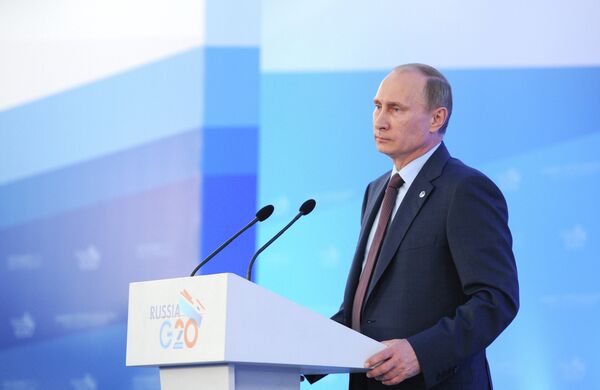ST. PETERSBURG, September 6 (RIA Novosti, Howard Amos) – The final day of the G20 summit in Russia on Friday did not see any significant narrowing of the split in the international community over US calls for a military strike on Syria, despite talks that stretched into the early hours of the morning.
The positions of US President Barack Obama and Russian President Vladimir Putin did not appear to change over the two-day summit, which is traditionally a forum for economic questions but this year has been dominated by the Syrian crisis.
In a press conference Friday, a visibly tired Putin reiterated his opposition to military intervention in the crisis without the support of the United Nations Security Council, and repeated his belief that fatal chemical weapons attacks in Syria, which Obama says were carried out by the ruling regime, were actually planned provocations.
“We do not agree,” Putin said after talks with Obama. “I do not agree with his arguments, and he does not agree with mine.”
Putin also said that Russia would continue to support the government of Syrian President Bashar Assad. “Will we continue to help Syria? Yes, as we help them at the moment. We supply arms and cooperate on economic issues,” Putin said.
Obama said Friday that the international community was “stuck” over Syria and criticized “paralysis” at the UN Security Council.
The United States maintains that Assad is responsible for an alleged chemical attack on August 21 that killed 1,400 civilians. “When there is a breach this brazen of a norm this important and the international community is paralyzed … that makes for a more dangerous world,” Obama said. “If we’re not acting, what does that say?”
A limited military strike against Syria would reduce its ability to use chemical weapons, and would be “not Iraq, not [putting] boots on the ground, not a long drawn-out affair,” Obama said.
The G20 agenda did not include a scheduled meeting between Obama and Putin, but the two men said Friday that they spent about 20 minutes talking about Syria. Both claimed that they had a functional relationship, with Obama describing their conversation as “candid and constructive,” and Putin calling it “well-disposed.”
The other world leaders attending the G20 summit in the tsarist-era Constantine Palace outside St. Petersburg were divided in their support for the US calls for military intervention in Syria.
Russia, China, India, Indonesia, Argentina, Brazil, South Africa, Italy, as well as the United Nations and the Pope, were all categorically opposed to military action, Putin said.
The White House released a statement later Friday calling for a “strong international response” to the use of chemical weapons in Syria. The statement was signed by Australia, Canada, France, Italy, Japan, Republic of Korea, Saudi Arabia, Spain, Turkey, the United Kingdom and the United States.
Syria was reportedly the main topic of conversation during a long dinner for world leaders on Thursday, and discussions continued deep into the night.
Putin told a session of the summit on Friday morning that he had had a bilateral meeting with UK Prime Minister David Cameron that lasted until 2:30 a.m.
Cameron said that, on Syria, Putin was “miles away from what I think the truth is and miles away from what many of us believe," British newspaper The Guardian reported Friday.
One of the strongest voices of support for Obama came from French President Francois Hollande, who repeatedly described Assad as a “dictator” and said that the lack of military action against Syria would strengthen other dictators across the world.
Obama has asked the US Congress to support military action in Syria, and a vote is expected after Congress reconvenes on Monday. Obama refused to be drawn Friday on what his response would be if Congress fails to support him, or if he only wins the backing of either the House of Representatives or the Senate.
Obama also said Friday that he would make a televised address from the White House to the American people about Syria on Tuesday.


